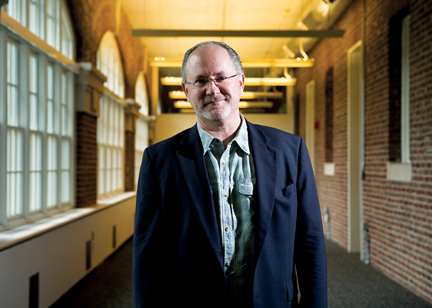Green Philly
Mark Alan Hughes ’81 combines policies and practicalities to advance the goal of a more sustainable city.
 Sustainability is quite the buzzword right now. From pundits to urban planners, engineers to environmentalists, it’s on everyone’s lips—and its meaning is manifested in various urban “green” initiatives around the country. But for Mark Alan Hughes ’81, architect, professor, policymaker, and innovator, sustainability has become the centerpiece of his body of work.
Sustainability is quite the buzzword right now. From pundits to urban planners, engineers to environmentalists, it’s on everyone’s lips—and its meaning is manifested in various urban “green” initiatives around the country. But for Mark Alan Hughes ’81, architect, professor, policymaker, and innovator, sustainability has become the centerpiece of his body of work.
Hughes, who worked as an adviser to Philadelphia Mayor Michael Nutter during his 2007 campaign, created and was the director of the city’s first Office of Sustainability and helped put together the ambitious plan for “Greenworks,” Nutter’s commitment to make Philadelphia the greenest city in the United States by 2015. Greenworks also provides a template for other cities pursuing sustainability goals.
“Mark was a central member of my team during the campaign and my first year in office, and he remains a friend and adviser to this day,” says Nutter. “His excitement for policy, ideas, and learning is just infectious.”
Now out of city government, Hughes teaches an interdisciplinary and interdepartmental course in sustainability—the first of its kind—at the University of Pennsylvania. The class is also an opportunity for students to engage the community in a number of green projects such as stormwater management and park improvements.
He also serves as a policy adviser with the Greater Philadelphia Innovation Cluster (GPIC), a consortium of academic institutions, regional economic development agencies, industry partners, and other organizations committed to developing ways to increase energy efficiency and reduce carbon emissions while leveraging those goals to help create jobs and investment opportunities—the very definition of sustainability, according to Hughes.
“The purpose is to transform the market for energy efficient buildings in Philadelphia,” Hughes says. “GPIC brings together and convenes industry, government, consumers, and so on to make that change and to give traction to energy efficiency.”
The GPIC hub is headquartered at the former Philadelphia Navy Yard. Hughes was instrumental in putting together a proposal on behalf of the consortium that resulted in a $130 million grant from the U.S. Department of Energy. Specifically, Hughes advises on markets and behavior. The hub is part meeting space and part design lab where innovators can experiment with energy-efficient lighting, materials, and building solutions as well as showcase their creativity to entrepreneurial audiences looking to connect sustainable solutions to economic development.
Leading up to his tenure as Philadelphia’s first director of sustainability, Hughes completed exhaustive research on urban poverty, which he put to use as a consultant at the Brookings Institution and the Ford Foundation’s Urban Poverty Program. As an adviser and developer of policies, Hughes has helped create several multi-million dollar economic development initiatives for the Department of Housing and Urban Development, including the nation’s largest publicly funded jobs program under welfare reform. He has taught at Princeton, Harvard, and Swarthmore and, now, the University of Pennsylvania, where he received an architecture degree in 2007.
Currently, Hughes is a Distinguished Senior Fellow in the University’s School of Design and at the T.C. Chau Center for Building Simulation and Energy Studies, a faculty fellow of the Penn Institute for Urban Research, and senior fellow of the Wharton School’s Initiative for Global Environmental Leadership.
At about the same time, he took on the role of policy consultant for the Nutter campaign. While in the city administration, Hughes helped launch a number of Greenworks projects, including installation of the nation’s first solar hot water facility on the roof of a prison. He also helped Philadelphia become the first city to build food goals into the sustainability plan. These include bringing local food to within a 10-minute walk of most neighborhoods and the planting of community gardens. Currently, Philadelphia has the second-largest number of food-producing community gardens of any city in the United States.
Among his many multidisciplinary projects, Hughes’ biggest cause is energy efficiency.
“Efficiency should be the ‘first fuel,’” he says. “Before we get to renewables, we need to improve our ability to reduce emissions and fossil fuel consumption in our buildings and transportation.”

Angelina Sciolla is a freelance writer and award-winning copywriter who has contributed to a wide range of national and regional media venues, including Publishers Weekly, Philadelphia Inquirer, Philadelphia Style, AOL, Home and Garden, and Lifetime TV. Her creative work is regularly seen in print, digital, and TV campaigns. She lives in Philadelphia.
 Email This Page
Email This Page